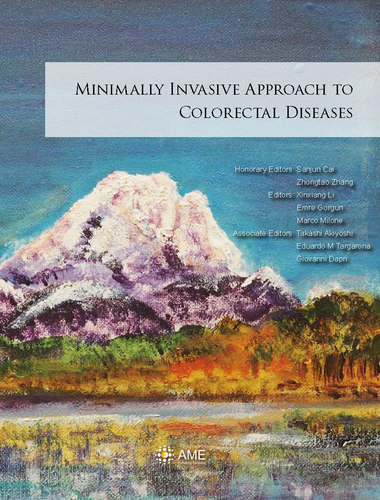
Minimally Invasive Approach to Colorectal Diseases
| Editors: | Xinxiang Li, Emre Gorgun, Marco Milone |
Publisher: AME Publishing Company; 1st edition (2018)
ISBN: 978-988-78920-1-4
Hardcover: 306 pages
Language: English
Minimal invasive surgery as a surgical approach is becoming more and more popular among surgeons all over the World. While laparoscopic approach has become Gold Standard for colonic surgery, its role in rectal pathologies treatment is still controversial. Probably due to its technical challenge and its longer learning curve laparoscopic colorectal surgery it is not yet widespread as it should be among surgeons, but in expert hands it has proven to be safe and effective. The aim of this manual is to discuss in detail minimal invasive surgery for colorectal pathology treatment, especially surgical indications and procedures techniques, in order to help its practical learning and its international diffusion.
Honorary Editors
| Sanjun Cai | Department of Colorectal Surgery, Chief Expert of Colorectal Cancer MDT, Fudan University Shanghai Cancer Center, China |
| Zhongtao Zhang | Department of General Surgery, Beijing Friendship Hospital, Capital Medical University, China |
Editors
| Xinxiang Li | Department of Colorectal Surgery, Fudan University Shanghai Cancer Center, Shanghai 200032, China |
| Emre Gorgun | Department of Colorectal Surgery, Digestive Disease Institute, Cleveland Clinic, Cleveland, Ohio, USA |
| Marco Milone | Department of Surgical Specialities and Nephrology, “Federico II” University, Naples, Italy |
Associate Editors
| Takashi Akiyoshi | Department of Gastroenterological Surgery, Cancer Institute Hospital, Japanese Foundation for Cancer Research, Tokyo, Japan |
| Eduardo M Targarona | General and Digestive Surgery Unit, Hospital de la Santa Creu i Sant Pau, Carrer Sant Antoni Maria Claret, Autonomous University of Barcelona, Barcelona, Spain |
| Giovanni Dapri | Department of Gastrointestinal Surgery, European School of Laparoscopic Surgery, Saint-Pierre University Hospital, Brussels, Belgium |
Secretary Of Editor
| Lei Liang | Department of Colorectal Surgery, Fudan University Shanghai Cancer Center, China |
| Qingguo Li | Department of Colorectal Surgery, Fudan University Shanghai Cancer Center, China |
| Yanlei Ma | Department of Colorectal Surgery, Fudan University Shanghai Cancer Center, China |
Table of Contents
Foreword
Preface
Overview of Minimally Invasive Colorectal Surgery
1 Current surgical considerations for colorectal cancer
10 Current status of minimally invasive surgery in colorectum
18 Improving preoperative endoscopic localization of colon and rectal tumours
20 Laparoscopic rectal resection—the road to safety surgery
Flexible Endoscopic Colorectal Tumor Resection (ESD & EMR)
26 Review: endoscopic submucosal dissection (ESD) and endoscopic mucosal resection (EMR)
34 The role of endoscopic submucosal dissection for Tis/T1 rectal cancer
41 Colorectal endoscopic submucosal dissection (ESD) could reduce the need for surgery of colonic polyps in the West
45 Endoscopic versus surgical resection for early colorectal cancer—a systematic review and meta-analysis
55 Incomplete resection after macroscopic radical endoscopic resection of T1 colorectal cancer—should a paradigm-changing approach to address the risk be considered?
Laparoscopic vs. Open Colorectal Surgery
60 Rectal cancer—state of art of laparoscopic versus open surgery
74 Examining outcomes for laparoscopic vs. open colonic resections in middle volume hospitals: comparative outcomes that need cautious interpretation
77 Hybrid natural orifice transluminal endoscopic surgery colectomy versus conventional laparoscopic colectomy for left-sided colonic tumors: intermediate follow up of a randomized trial
82 Laparoscopic rectal resection versus open rectal resection with minilaparotomy for invasive rectal cancer
Techniques in Minimally Invasive Colorectal Surgery (I) – Colon
92 Emerging single port laparoscopic colorectal surgery
94 Comparison of short-term outcomes between laparoscopic-assisted and open complete mesocolic excision (CME) for the treatment of transverse colon cancer
101 Completed mesocolic excision for right colon cancer: comparison between single-port laparoscopy and conventional laparoscopy
111 Operational approaches for laparoscopic complete mesocolic excision in right hemicolon cancer
118 Laparoscopic assisted multi-visceral resection in stage IV rectal cancer
121 Laparoscopic-assisted radical left hemicolectomy for colon cancer
124 Laparoscopy-assisted complete mesocolic excision for right-hemi colon cancer
67 Robotic-assisted thoracoscopic segmentectomy: there is a long way to go
126 Lighted ureteral stents in laparoscopic colorectal surgery; a five-year experience
130 Monopolar hook electrode assisted laparoscopic resection of descending colon cancer
134 Key points of tumor-free operation in laparoscopic resection for colorectal cancer
139 Virtual reality training in laparoscopic colorectal surgery
143 Laparoscopic radical treatment with preservation of left colon artery and superior rectal artery for sigmoid colon cancer
149 Simultaneous laparoscopic distal gastrectomy (uncut Roux-en-Y anastomosis), right hemi-colectomy and radical rectectomy (Dixon) in a synchronous triple primary stomach, colon and rectal cancers patient
154 Vessel-centered laparoscopic total mesorectal excision via medial approach
Techniques in Minimally Invasive Colorectal Surgery (II) – Rectum
168 Autonomic nerve preserving in laparoscopic total mesorectal excision
174 High ligation of inferior mesenteric artery in laparoscopic resection of rectal cancer: is it safe or dangerous?
178 Laparoscopic anterior resection of rectal cancer with lymph node dissection around the inferior mesenteric artery with preservation of the left colic artery (LAR-LND-PLCA)
182 Laparoscopic approach for retrorectal tumors—results of a series of 11 cases
189 Single-access laparoscopic rectal resection: up-to-down and down-to-up
204 Laparoscopic modify extralevator abdominoperineal resection for rectal carcinoma in the prone position
208 Reduced-port laparoscopic surgery for rectal cancer
211 Laparoscopic total mesorectal excision (TME) with electric hook for rectal cancer
Robotic Surgery in Colorectal Cancer
219 Laparoscopic vs. robotic colorectal resections: new insights from the American College of Surgeons National Surgical Quality Improvement Program
221 Update on robotic surgery for rectal cancer treatment
231 A review on robotic surgery in rectal cancer
238 Single stage robotic total mesorectal excision—a stepwise approach
244 Robot-assisted approach to a retrorectal lesion in an obese female
249 Selective lateral pelvic lymph node dissection through a robotic approach for rectal cancer treated with preoperative chemoradiotherapy: a long way for generalization
253 Modular approach for single docking robotic colorectal surgery
Laparoscopic Surgery of Colorectal Metastases
255 Are the clinical risk scores of survival after colorectal liver metastases still valuable in the era of laparoscopic liver surgery?
257 Synchronous resection of colorectal primary and hepatic metastasis
Management of Complication in Minimally Invasive Colorectal Surgery
269 Prevention and management of hemorrhage during a laparoscopic colorectal surgery
275 Small bowel obstruction after colon cancer surgery: does the laparoscopic approach mitigate risk?
279 Prolonged postoperative ileus after colorectal surgery: still an unresolved problem


